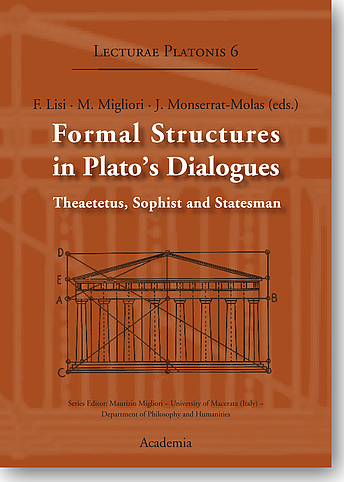Lisi | Migliori | Monserrat-Molas
Formal Structures in Plato's Dialogues
ISBN 978-3-89665-517-2
englischThe three dialogues, which are the object of the collected papers included in this volume, are a unicum in the Platonic corpus. No other existing trilogy is connected dramatically so clearly as they are. From the formal point of view, in these texts Plato shows his brilliant literary ability in all its facets in order to deploy all the grades of the philosophical inquiry, always related to education: maieutikoselenchus, dialectical dihairesis and everything entangled with allegory and myth. In the first dialogue of the trilogy Socrates searches in Theatetus' soul for the definition of episteme, not knowledge in general, but the specific wisdom proper of the true philosophers. In the following Sophist and Statesman, on the other hand, a new character, the guest from Elea, offers the science they had looked for as a gift, the diairesis. The exercises in it serve also for distinguishing the true philosopher-statesman from his fake: the sophist and all the historical politicians acting in the scene. Actually these dialogues develop the subject of the excurse, which stands at the centre of the Theaetetus (172c3-177c5): the opposition between true and false philosopher.
englischThe three dialogues, which are the object of the collected papers included in this volume, are a unicum in the Platonic corpus. No other existing trilogy is connected dramatically so clearly as they are. From the formal point of view, in these texts Plato shows his brilliant literary ability in all its facets in order to deploy all the grades of the philosophical inquiry, always related to education: maieutikoselenchus, dialectical dihairesis and everything entangled with allegory and myth. In the first dialogue of the trilogy Socrates searches in Theatetus' soul for the definition of episteme, not knowledge in general, but the specific wisdom proper of the true philosophers. In the following Sophist and Statesman, on the other hand, a new character, the guest from Elea, offers the science they had looked for as a gift, the diairesis. The exercises in it serve also for distinguishing the true philosopher-statesman from his fake: the sophist and all the historical politicians acting in the scene. Actually these dialogues develop the subject of the excurse, which stands at the centre of the Theaetetus (172c3-177c5): the opposition between true and false philosopher.


